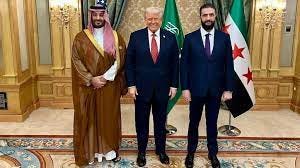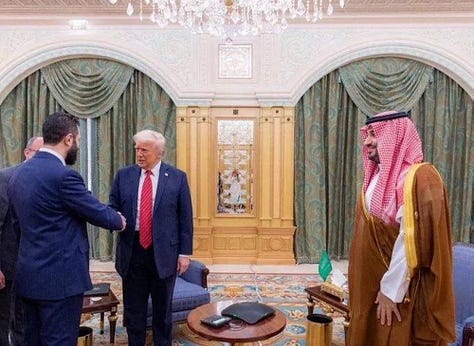Israel PM Netanyahu ‘hubris’ shaken by recent Trump moves
‘Angst’ in Israel as it finds itself out of step with Trump’s second term aims.



Early in President Trump’s new term, there was a sense of “hubris” from Israeli Prime Minister Benjamin Netanyahu and his American-born top advisor Ron Dermer that almost any action that the Israeli government wanted to take, they would have “carte blanche” from Washington to do it, an Israeli analyst said this week. That over-confidence has been badly shaken by developments in recent weeks, Israel analysts said.
Israel has felt its stature as Washington’s preeminent ally in the region take a hit as it has watched Trump bypass Israel on his trip to Saudi Arabia, Qatar and the United Arab Emirates this week; announce massive weapons sales, AI and energy projects on the trip divorced from any promise of Saudi or Qatari normalization with Israel; meet with the new Syrian president and announce the lifting of US sanctions on Syria; cut a deal directly with Hamas for the release of an American hostage that bypassed Israel; and tout a prospective nuclear deal with Iran.
“I think mostly what’s interpreted here in Israel is sort of like, how could we have lost our position?” Dr. Shira Efron, research director of the Israeli Policy Forum, said on an IPF Zoom panel Thursday. “There’s a sense in Israel of a downgrading of its importance.”
“And I have not met with the Prime Minister, but I've heard from people who see him in cabinet decisions, and they say that the impact is very noticeable, that he is not himself,” Efron said.
‘Angst’ as Israel finds itself out of step with Trump’s second term aims
Many Israelis had “wild” expectations of how supportive Trump would be of an Israel currently seemingly committed to a path of endless war in Gaza and lobbying for military action on Iran that Trump seeks to avoid, said IPF’s Policy Director Michael Koplow. Now they are overreacting to the sense Trump has found other regional leaders more in synch with his vision for big deals and reduced U.S. military commitments.
“It’s maybe an understatement to say that there's a lot of angst in Israel from Israelis across the board,” Koplow said on the IPF Zoom. “Israelis have this view…that Pres. Trump is the most pro-Israel president in history, and he's going to let Israel do pretty much anything it wants. … So there were these wild expectations, and certainly they have not been borne out.”
“When Pres. Trump took office, on day one, he was pretty clear he wanted to explore the possibility of an Iran deal,” Koplow continued. “And any Iran deal was never going to be full dismantlement of the program…And that goes against what PM Netanyahu has laid down as his standard.
“So this collision course was there, and it's not because President Trump is a different guy this time around,” he continued. “I think what Israel wanted last time fit very well into what President Trump wanted, and what Israel wants this time does not. And so that's what we're seeing.”
‘Mr. Washington’
In February, when Netanyahu and Dermer returned to Israel after the Israeli prime minister on Feb. 4 became the first foreign leader to be granted a White House visit in Trump’s second term, “everyone who met them both said that there's really just like a sense of hubris that they own Washington, that they're going to make this administration do anything they want,” Dr. Shira Efron, research director of the Israeli Policy Forum, said on an IPF Zoom panel Thursday.
In her interactions at that time with Israeli defense establishment contacts, “there were a lot of discussions on, ‘we can now shut down the gates to Gaza. No one's going to care about the humanitarian issues,’” Efron said. “‘They're going to let us strike Iran’… Any direction the Israeli government wanted to take, they just assumed they will have carte blanche to do it.”
The mood shifted after Netanyahu was abruptly summoned to the White House on April 5 for a second meeting with Trump, during which Trump announced that the United States and Iran were going to begin direct talks, facilitated by Oman. “Even though Israel was not surprised,” Efron said, it was very clear that, rather than the Netanyahu owning Trump, “it was the other way around.”
Then last week, on May 6, Trump abruptly announced that the U.S. had reached a ceasefire deal with Yemen’s Houthi rebels, under which the US would stop bombing the Houthis and the Houthis would stop firing on U.S. and international shipping. But the Omani-mediated deal did not include a Houthi pledge that the Iran-backed group would stop firing missiles at Israel. [Indeed, during the IPF Zoom on Thursday, Efron had to excuse herself for several minutes to go to a bomb shelter after a siren indicated an incoming Houthi missile being fired at Israel.]
Last Thursday (May 8), as the Trump administration was preparing for his trip this week to the Middle East, it emerged that Dermer, Israel’s Minister for Strategic Affairs, was granted a meeting with Trump. But if initially that was seen as a sign of Dermer’s clout, soon “leaks on both sides of the ocean indicated” that it “was not a good meeting,” Efron said. “The President was losing his patience with Israel and with its approach to everything.”
Then over the weekend, the U.S. announced that Trump envoy Steve Witkoff had made a deal with Hamas for the release of the last living American hostage held by the group, Edan Alexander. The deal bypassed Israel, which reneged on a past deal to get more of its remaining 58 hostages out because it refuses to end the war against Hamas in Gaza.
During Trump’s trip to Arab Gulf states this past week, “I think the first thing that sort of struck Israel by surprise is the de-linkage of all these goodies that partners in the Gulf got” with no “connection to normalization with Israel,” Efron said.
On Trump’s historic meeting with new Syrian president Ahmad al-Sharaa in Saudi Arabia on May 14 and his announcement that he was ordering the cessation of US sanctions on Syria, “in Israel, it's interpreted [that]… Israel used to be the gateway of Arabs to Washington, and now the gateway is [Saudi Crown Prince] Mohammed bin Salman and the Gulf partners, and Israel just feels like they're not there.”
Trump said today that he did not consult with Israel before deciding to lift sanctions on Syria, because he thought it was the right thing to do.
Trump finds Gulf Arab leaders more on same page
If Israel had misplaced expectations for Trump’s second term, many Arab Gulf leaders find themselves more in synch with Trump 2.0’s pursuit of stability and big deals in the region over conflict.
Trump’s Arab Gulf hosts this week now strongly prefer that the United States and Iran reach a negotiated deal to ensure that Iran does not get a nuclear weapon, rather than see another destabilizing conflict in the Middle East. That contrasts from Trump’s first term, when now Emirati President Sheikh Mohammed bin Zayed and Saudi Crown Prince Mohammad bin Salman, like Israel’s Netanyahu, pushed for Trump to quit the 2016 Iran nuclear deal. Trump did so in 2018, and Iran’s nuclear program has advanced considerably since then.
“Since his more hawkish posture during Trump’s first term, particularly in backing the U.S. withdrawal from the Iran nuclear deal, Crown Prince Mohammad bin Salman has matured as a statesman,” said Khalid Aljabri, a Washington-based Saudi cardiologist whose father once served as a top advisor to the former Crown Prince Mohammed bin Nayef.
“Saudi foreign policy today is more nuanced and pragmatic, reflecting the Crown Prince’s growing experience.”
“He seems to be enjoying the credit he is receiving for brokering peace deals and prisoner exchanges,” Aljabri said of bin Salman. “For the first time, he saw ordinary citizens of another Arab country celebrating something he brokered—the meeting between Trump and Syria’s President, and the lifting of U.S. sanctions.”
“That’s an interesting moment for him, to discover that there are people who are not politicians and not businessmen who will applaud sound, pragmatic policies,” he said. “It is good, and it shows evolving pragmatism, that many hope would extend domestically.”
**


